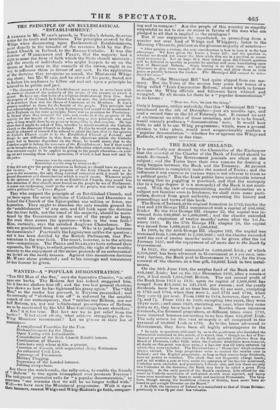THE PRINCIPLE OF AN ECCLESIASTICAL "ESTABLISHMENT."
A rassaell in Mr. %Vann's speech, in Tuesday's debate, deserves notice fur its truth and manliness. The principles avowed by the srbigs when discoursing upon Ecclesiastical Establishments, point directly to the transfer of the revenues bold by the Pro- testant Church in Ireland, to the Roman Catholic. It was the doctrine of WARBURTON and PALEY, that the majority bad a right to name the form of faith which the State should maintain ; end the creeds of individuals who might happen to sit on the throne, or hold sway in the councils of the nation, ought in no way to influence them in favour of any sect. In the application of the doctrine they recognize as sound, the Ministerial Whigs stop short ; but Mr. WARD, and he alone of his party, feared not to declare his readiness to tallow out and act upon a principle he believed to be politic and just. "The character of a Church Establishment must vary in accordance with the assent or dissent of the majority of the people of the country in which it existed. He knew no uther basis of a religious establishment than this. And the property of the Church he believed to be no more the individual property of its ministers than was the House of Commons of its Members. It was a property confided to them fur the benefit of the people. This principle had been acknowledged in Scotland, when Episcopacy had ceased to be maintained ; and in England, on the same principle, there was no provision for Presbytery. in Ireland alone they reversed the rule, and conliscatA the property of the majority for the benefit of the few ; and as long as this principle was acted upon, so long would there be no peace or tranquillity in that country. He was aware that it might be asked of him, whether he would establish the Catholic Church as the dominant Church iu Ireland. To this he would answer, for he should be ashamed of himself if he refused to admit the fact, that in his opinion the Catholic Church ought to be the Established Church of Ireland; and though he saw difficulties in this, from the objections which the Catholic priests had to become dependent on the State, be would assert, that to the Catholics ought to belong the revenues of the Establishment; but if that could not be brought about, (and he admitted the difficulties which were in the way,) those revenues ought to be applied in giving to the people education—in root- ing out an] rescuing them from ignorance, of which it had been well said by
the pet-
" Ienorance was the curse or heaven, Knowledge a as the wing by which we fly."
If they did not give the people education in Ireland, we should have no peace in that country.* * If the property of the Irish Church were to be * given to the minority, the only thing national connected with it would be the general discontent and dissatisfaction which it would create. Whatever might be the opinions of the people as to an Established Church, they would lose their attraction if that church were forced on the people by act of Parliament. A system not conforming itself to the wish of the people, was what might be oiled a political lie."—Tine's Report. They who support the principle of 'an Established Church, and vet force upon the seven millions of Catholics and Dissenters in Ireland the Church of the Episcopalian one million or fewer, are hypocrites. They ought to abandon the only tenable ground for the "establishment" of any sect, and fall back upon the doctrine that the true faith, not the creed of the majority, should be main- tained by the Government at the cost of the people at large. But even then comes the question—whose is the true faith ? Mine, certainly, says the satisfied Anglican Churchman. De- nials are proclaimed from all quarters. Who is to judge between the dissentients ? Practically the Legislature settles the question ; and it has been decided by the British Parliament, that Pro- testantism is the true faith. The resort, however, is to the ultima ratio—compulsion. The PEELS and ST ANLEYS have reduced their opponents, the IV higs, to admit, practically, the right of' the wealthy minority to the enjoyment of the entire proceeds of an ecclesiastical tea levied on the needy masses. Against this monstrous doctrine Mr. WARD alone protested ; and to his courage and consistency let due honour be given.


























 Previous page
Previous page